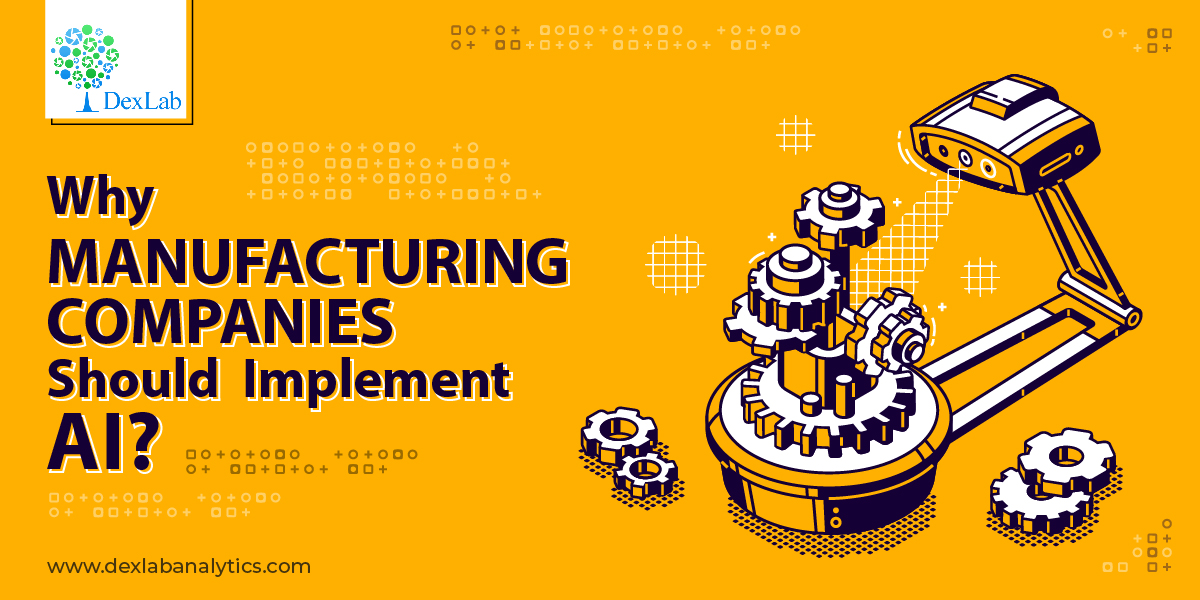Over the last couple of years we have witnessed an exponential growth in the AI domain. The expansion of AI along with its various subsets are being acknowledged and adopted by different sectors to garner benefits from its various applications.
The manufacturing companies are among those few smart decision makers who were quick to realize the deficiencies present in their current system, and how implementing AI technology could help them address those issues. Retail Analytics Courses are being designed to enable the future professionals to better handle the challenges of the sector.
The key challenges in manufacturing
Before we can proceed to discuss the ways AI is being incorporated in manufacturing, we need to have a thorough understanding of what are the key problem areas this sector faces on a regular basis to realize how AI can tackle those issues.
Operational efficiency, operational safety, inventory control, maintaining product quality, lower operational costs and demand forecasting are some of the issues the companies basically deal with.
Now have a look at how incorporating AI can benefit the companies and in which ways
Ensuring product quality
It is of utmost importance for any manufacturer to ensure that the products are absolutely flawless. So, the products undergo different stages of checking by trained and experienced professionals. But, despite so much precaution being taken faulty products do make their way into the market resulting in customer complaints and the company having to recall the product line. This could be a damaging factor for the brand.
However, with smart sensors in place, even tiniest of errors could easily be detected. Machine vision can scan the products when they are in the production stage and after spotting a problem sends alerts. Professionals having a background in computer vision course python, would be assets for this sector. Nokia’s machine learning based video application can be an excellent case in point as it allows to detect and rectify mistakes in real-time.
Achieving better maintenance standards
Asset failure is one of the key issues that bug manufacturers, due to untimely upkeep and lack of proper maintenance strategies, machines can breakdown often bringing the whole production process to a standstill mode.
Predictive analysis can solve this issue and ensure enhanced operational efficiency. It involves the application of analytics, sensors to keep the machines in check on a regular basis so as to detect any problem areas that need to be repaired or, replaced. This ensures that machine downtime does not impact the production process in any which ways and this also extends life span of machines. Roland Busch, Thales SA, are some of the companies that have successfully implemented and benefited from predictive maintenance technology.
Achieving efficiency in designing process
AI powered technology can definitely boost the designing procedure by taking the whole assumption factor out of the process. Predicting consumer behavior and deciding what products customers are looking for to come up with a design that matches that particular criterion is essential. A degree in customer marketing analysis training could enable a professional be proficient in this job.
Generative design software takes hassle out of the design process, it basically processes data regarding the criteria, different parameters, restrictions, time and budget constraints and offers solutions on the basis of that and also offers insight regarding which design might work best.

Prioritizing security
Ensuring safety of the workers in any manufacturing unit is of utmost importance. Despite taking precautions and safety measures being in place accidents occur due to human error.
To minimize the risk factors AI powered industrial robots can be used in the plants and manufacturing units. The bots will process real-time data and analyze that to minimize risk in a hazardous work situation where human workers could be vulnerable. Since, these bots would be able to analyze data with precision there would be less room for errors.
Manufacturing companies are already applying AI techniques to ensure safe and efficient production environment. The hybrid workforce comprising human and robots , has already become a reality, in future more tasks could be allotted to robots to automate production process and reducing operational costs.
In order to retain jobs in the coming future one has to undergo specialized training such as deep learning for computer vision with python to land a job, because no matter how you look at it the future certainly belongs to AI.
.
